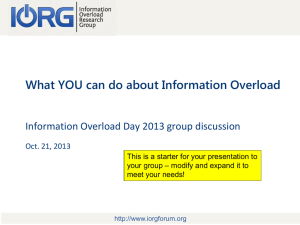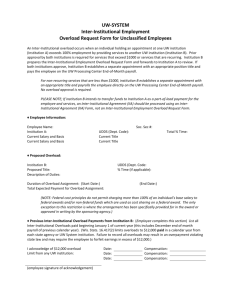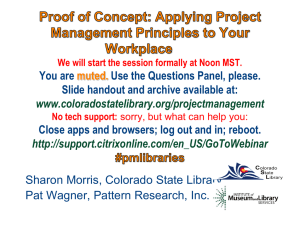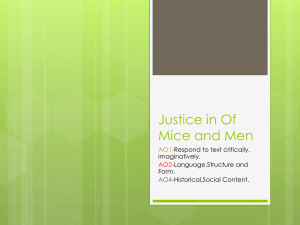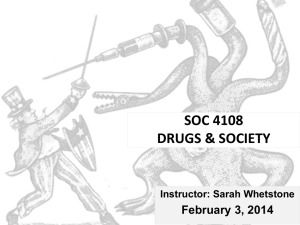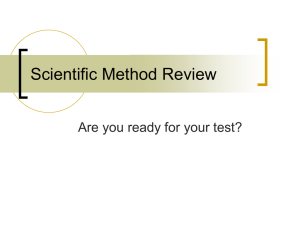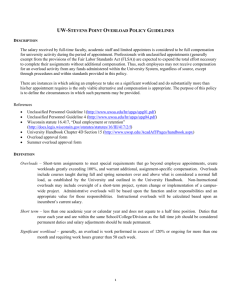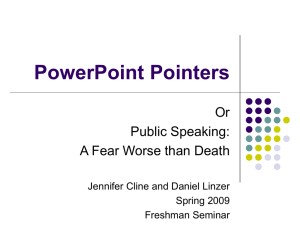Coping with Information Overload
advertisement
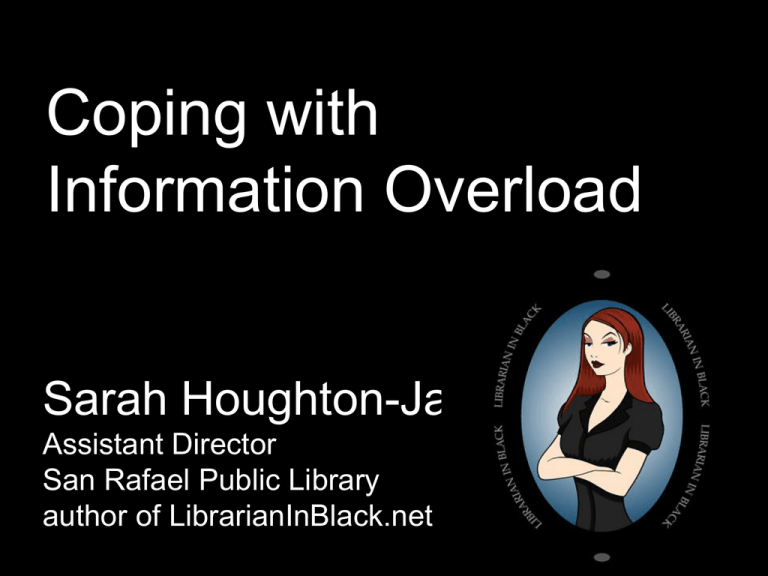
Coping with Information Overload Sarah Houghton-Jan Assistant Director San Rafael Public Library author of LibrarianInBlack.net What happened to us? 2 “We have become far more proficient in generating information than we are in managing it, and we have also built technology that easily allows us to create new information without human intervention.” ~Jonathan B. Spira “In an online world of small pieces loosely joined, librarians are among the most well qualified and highly motivated joiners of those pieces.” ~ John Udell – “Remixing the Library” where does information overload come from? the desire to know and to be a part of things. 5 6 effects of info overload 28% (2.1 hours) of a knowledge worker’s day is consumed by interruptions. --2005 Basex survey IQ scores when interrupted by emails/phone calls = 10 points lower (smoking marijuana = 4 points lower). --2005 University of London study 7 Attention Deficit Trait: a sustained negative neurological effect of information overload. “The brain and body get locked into a reverberating circuit while the brain's frontal lobes lose their sophistication...People with ADT have difficulty staying organised, setting priorities, and managing time, and they feel a constant low level of panic and guilt.” --"Overloaded Circuits: Why Smart People Underperform." E.M. Hallowell. 8 control the influx inventory your inputs Inventory all of your devices (work and home), and what you view on each. weed, weed, weed... mercilessly! teach others communication etiquette organizational skills work toward your goals through daily and weekly tasks "To think too long about doing a thing often becomes its undoing." -- Eva Young file things immediately - automate if possible organize like with like take a class on file management file new things away • choose a method for tracking ideas & files (del.icio.us, Word, Evernote) • might be multiple methods • think about what you’re saving • name the file topically & specifically • add dates (YYMMDD) for periodic stuff keep a master waiting list of what’s owed to you stay neat (virtually & physically) try new things and see if tech works for you, even if you fall away in the end time management skills Keep a detailed time diary (10 min increments) for 1 week. ~~~ Write down what you do and why (no lying). ~~~ Review the results for efficiencies, distractability, time of day patterns, etc. use your calendar to its fullest capabilities schedule yourself to organize and do unscheduled work take breaks. no, for real. use downtime stress management skills schedule unplugged time unplug at will eliminate stressful interruptions you choose when you interact with technology or information cut down your to-do list to what really matters learn how to say NO at home, set up a quick consistent way to note to yourself urgent work issues balance your life to your own standards think of information as a stream, not a lake. tips for dealing with specific types of information print information Decide: do you prefer print to digital? If it’s unread 3 issues in a row, unsubscribe Get rid of “the pile” Unsubscribe from catalogs: CatalogChoice.org 43 online newsletters How is it being pushed to you? Best way? If it’s unread 3 issues in a row, unsubscribe If via email, create filters to put all new issues into one folder Get rid of “the digital pile” 44 online learning Schedule yourself for live sessions No multi-tasking during sessions Keep a wish list of archived sessions Build these into your yearly training goals 45 email overload Start scheduling email scan time Use email only when appropriate Deal with email by subject Use folders and filters 46 & more email overload tips Flag and file items for follow-up INBOX ZERO Follow good email etiquette Delete and archive 47 email listservs Filter into folders Weed your listservs heavily If you ignore a listserv for 2 weeks, unsubscribe 48 blogs If 5+ blogs, use RSS (Google Reader) Review daily, or at least weekly (if few) Flag and file items for follow-up Periodically weed feeds 49 RSS Use RSS when appropriate Organize feeds into folders If an avid RSS user, use it to send you reminders during the day 50 interruptive tech overload Phones, text messaging, IM Check when you want to Use your status message well Turn it OFF 51 social networks Pick a primary network Sort contacts into groups Schedule time to interact, read updates Choose one alert type (email, SMS, pop-up) 52 Twitter Think of it as a stream, not a lake Use a Twitter client: Tweetdeck or Hootsuite Flag items for follow-up (Evernote, email) Regularly weed the people you follow 53 netcasts Replace radio with podcasts Use a client like Google Listen or iTunes Regularly weed your subscriptions If nothing useful for 3 shows, unsubscribe 54 serendipitous surfing Have a method for tracking useful finds (Evernote, wiki, blog, bookmarks) Weed mercilessly Surfing = time suck 55 “[I]f you want to use current information technologies fully to address the problems and opportunities that your library faces, then you must quit complaining and lock and load.” --Roy Tennant, Library Journal 2003 56 pick what works for you. only do what you realistically will follow up on. 57 above all else, breathe. 58 Further Resources “Being Wired or Being Tired: 10 Ways to Cope with Information Overload” by Sarah Houghton-Jan (from Ariadne) "How to Stop Your Inbox Exploding" by Cory Doctorow Information Overload: We Have Met the Enemy and He Is Us by Jonathan B. Spira 59 Questions? Sarah Houghton-Jan email: LibrarianInBlack@gmail.com web: LibrarianInBlack.net twitter: @TheLiB 60
